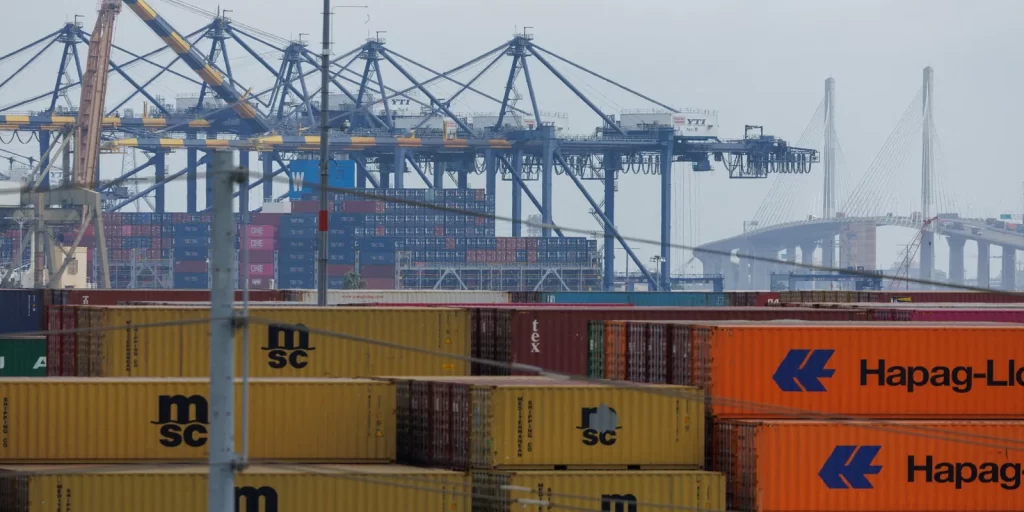‘No-one will win’ – Canada, Mexico and China respond to Trump tariff threats
4 min read
Canada, Mexico, and China have issued strong reactions to U.S. President-elect Donald Trump’s threats of heavy tariffs on their goods, warning that such a move could lead to economic upheaval and trade retaliation. In his plans for his first day in office, Trump announced he would impose 25% tariffs on imports from Mexico and Canada, along with a 10% tariff on Chinese goods. The proposed tariffs are part of Trump’s strategy to address issues such as illegal immigration and drug trafficking, which he claims are exacerbated by trade with these nations.
Mexico’s President Claudia Sheinbaum was quick to respond, asserting that tariffs would escalate into a cycle of retaliatory measures that could harm all nations involved. She emphasized the risk that a trade war would put businesses at risk across the continent. “One tariff will follow another, and so on, until we put our common businesses at risk,” Sheinbaum stated, stressing that such actions would not solve the underlying issues like drug use or migration.
Canada’s Prime Minister Justin Trudeau expressed concern over Trump’s proposed tariffs and the potential damage they could inflict on the Canadian economy. Trudeau noted that he had spoken to Trump following the tariff announcement and was planning to meet with provincial leaders to discuss possible responses. “This is a relationship that we know takes a certain amount of working on, and that’s what we’ll do,” Trudeau said, indicating Canada’s willingness to engage in dialogue and find constructive solutions. Trudeau also pointed out that migration across the Canadian border was much smaller in comparison to the situation at the U.S.-Mexico border.
China’s response was similarly cautionary. A spokesman for the Chinese Embassy in Washington, Liu Pengyu, warned that no one would win from a trade or tariff war. Liu also refuted Trump’s claims regarding China’s involvement in smuggling fentanyl-related chemicals, calling the accusations against China baseless. “The idea of China knowingly allowing fentanyl precursors to flow into the United States runs completely counter to facts and reality,” Liu said, reiterating China’s commitment to cooperating with the U.S. on drug control issues.
The reactions from Mexico, Canada, and China highlight a broader international concern about the economic consequences of a trade war. Trudeau and Sheinbaum both pointed out that trade between their countries and the U.S. is highly interconnected, with significant exports such as oil, electricity, and critical minerals flowing from Canada to the U.S. Mexico, too, plays a crucial role in the U.S. supply chain, particularly in the automotive industry, where tariffs could have a severe impact on manufacturers like General Motors.
The proposed tariffs come at a time when the U.S. already imposes significant tariffs on Chinese goods, a policy that President Joe Biden has continued from Trump’s administration. As it stands, a large portion of the trade between China and the U.S. is subject to tariffs—66.4% of U.S. imports from China and 58.3% of Chinese imports from the U.S. The risk of further escalation, especially with the U.S. threatening tariffs on Canada and Mexico, could strain global economic relations.
Provincial leaders in Canada have also expressed alarm. Ontario Premier Doug Ford called the tariffs “devastating” for both Canadian and U.S. workers, pointing out that the comparison to Mexico was insulting. Other premiers, including those from Quebec, Saskatchewan, and British Columbia, shared similar concerns, highlighting the economic damage the tariffs could cause to workers and businesses on both sides of the border.
The Canadian dollar, already sensitive to Trump’s trade policies, saw a significant drop in value following the tariff announcement. The Loonie dipped below 71 U.S. cents, marking its lowest point since May 2020, when similar tariff threats were made during Trump’s first term. Meanwhile, the Mexican peso also suffered, falling to its lowest value in 2023, further illustrating the financial instability caused by the looming threat of tariffs.
Both Canada and Mexico are exploring ways to counteract the potential impact of the tariffs, with Canadian officials discussing the possibility of imposing their own retaliatory tariffs on U.S. goods. Freeland, Canada’s Deputy Prime Minister, emphasized that the goods Canada exports, such as oil and critical metals, are highly important to the U.S., making a trade war harmful to both sides. However, she called for a measured response, stating, “We sell them things they really need.”
In the face of these mounting tensions, all three countries have urged the U.S. to reconsider its proposed tariffs, warning that the ensuing trade war would damage the economies of all parties involved. While Trump’s tariffs are framed as a means to address domestic concerns, the global economic repercussions could be far-reaching. The situation continues to develop as leaders on both sides prepare for the new administration’s policy implementation in January.







